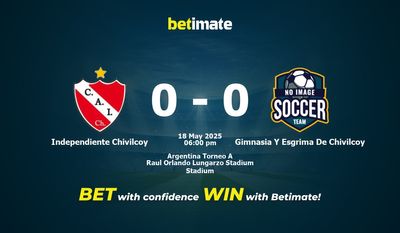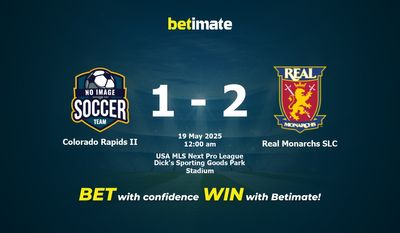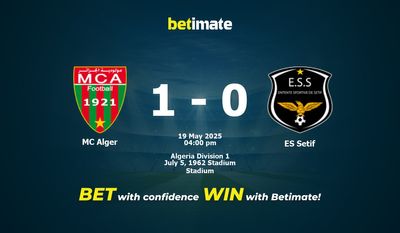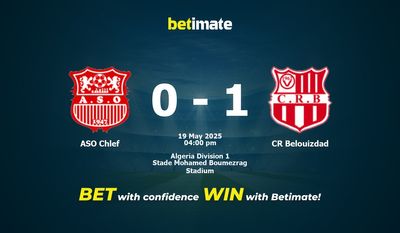Quick Betimate
Popular Leagues
-
UEFA Nations League
-
England (22)
- FA Cup
- Premier League (9)
- Championship (1)
- League 1 (1)
- League 2 (1)
- National League (2)
- National League North (1)
- National League South (1)
- EFL Trophy
- Premier League 2
- Championship Women
- Development League 2 (1)
- FA Cup Women (1)
- FA Trophy
- FA Vase
- Isthmian Division One North
- Isthmian Division One South
- Isthmian Premier Division
- National League Cup
- Northern League Division One
- Northern Premier League
- Reserve Matches
- Southern Premier League Central
- Southern Premier League South
- Super League Women
- U21 Premier League Cup
- Northern Ireland Championship
- Northern Ireland Championship Women
- Northern Ireland Cup
- Northern Ireland Intermediate Cup
- Northern Ireland League Cup Women
- Northern Ireland Play-Offs
- Northern Ireland Premier
- Northern Ireland Premier Intermediate League
- Northern Ireland Premier League Women (4)
- Northern Ireland Reserve League
- Scotland Regional Cup
- Wales League Cup Women
-
Japan J-League Cup (7)
-
UEFA Champions League (1)
-
Spain (107)
- La Liga (10)
- Segunda (5)
- Tercera Group 1 (2)
- Tercera Group 2 (3)
- Tercera Group 3 (2)
- Tercera Group 4 (2)
- Tercera Group 5 (2)
- Tercera Group 6 (2)
- Tercera Group 7 (2)
- Tercera Group 8 (2)
- Tercera Group 9 (2)
- Tercera Group 10 (2)
- Tercera Group 11 (2)
- Tercera Group 12 (2)
- Tercera Group 13 (2)
- Tercera Group 14 (2)
- Tercera Group 15 (2)
- Tercera Group 16 (4)
- Tercera Group 17 (3)
- Tercera Group 18 (2)
- Youth League
- Copa De La Reina (1)
- Copa del Rey
- Kings League - 40 mins play (1)
- Primera Division RFEF Group 1 (10)
- Primera Division RFEF Group 2 (10)
- Primera Federacion Women (1)
- Primera Women
- Queens League - 40 mins play
- Regional Cup
- Regional League
- Segunda Division RFEF Group 1
- Segunda Division RFEF Group 2
- Segunda Division RFEF Group 3
- Segunda Division RFEF Group 4
- Segunda Division RFEF Group 5
- Segunda Division RFEF Play-Offs (10)
- Segunda Federacion Women
- Tercera - Play-Offs (19)
- Tercera Federacion Women
- Women Regional League
-
USA (795)
-
UEFA Europa League (1)
-
Germany (74)
- Bundesliga I
- Bundesliga II (9)
- DFB Pokal (1)
- Regionalliga Bayern
- Regionalliga North (3)
- Regionalliga North East (8)
- Regionalliga South West
- Regionalliga West
- Oberliga Baden-Wuerttemberg (1)
- Oberliga Bayern North
- Oberliga Bayern South
- Oberliga Bremen
- Oberliga Hamburg
- Oberliga Hessen (1)
- Oberliga Mittelrhein (6)
- Oberliga Niederrhein (8)
- Oberliga Niedersachsen (9)
- Oberliga NOFV Nord (2)
- Oberliga NOFV Sud (8)
- Oberliga Rheinland-Pfalz/Saar (5)
- Oberliga Schleswig-Holstein
- Oberliga Westfalen (5)
- 3. Liga
- Bundesliga II Play-Offs
- Bundesliga II Women (7)
- Bundesliga Play-Offs
- Bundesliga U19
- Bundesliga Women
- DFB Pokal Women
- Regionalliga Play-Offs
- U19 Cup (1)
-
Italy (34)
- Serie A (9)
- Serie B (1)
- Serie C Group A
- Serie C Group B
- Serie C Group C
- Campionato Nazionale
- Campionato Primavera 1 (2)
- Campionato Primavera 2 (2)
- Serie D (3)
- Coppa Italia
- Coppa Italia Women
- Campionato Primavera 3
- Campionato Primavera 4
- Serie A Women
- Serie B Play-Offs (4)
- Serie B Women (1)
- Serie C Play-Offs (4)
- Serie C Super Cup
- Serie D Play-Offs (8)
- U19 League Women
-
France (15)
-
Netherlands (25)
-
Scotland (10)
-
Japan J-League (2)
-
Denmark Superligaen (5)
-
Cyprus Division 1 (3)
-
Israel Premier League (2)
-
Colombia Primera A (5)
-
Indonesia Liga 1 (2)
-
Colombia Primera B (7)
-
Esport (68)
Other Leagues
-
Albania
-
Algeria (5)
-
Andorra (5)
-
Angola (4)
-
Argentina (80)
- Nacional B (10)
- Primera B Metropolitana (7)
- Primera C Metropolitana (11)
- Reserve League
- Cup (11)
- Torneo A (15)
- Copa Santa Fe
- Championship Women (7)
- Copa de la Liga Profesional
- Copa Santa Fe Women
- Liga Profesional (4)
- Liga Profesional Reserves (15)
- Nacional Reserve League
- Regional League
- Youth League
-
Armenia (8)
-
Aruba (3)
-
Australia (119)
- A-League (2)
- A-League Women
- Capital Territory NPL2 (4)
- Capital Territory NPL2 U23 League
- Capital Territory Premier League (4)
- Capital Territory Premier League Women
- Capital Territory Premier League Women Reserves
- Capital Territory U23 League
- Cup
- Cup Qualifying
- Darwin Premier League
- FFA Cup Qualifying
- New South Wales League 1 (8)
- New South Wales League 2
- New South Wales NPL Women (7)
- New South Wales NPL2 Women
- New South Wales Premier League (8)
- New South Wales U20 League (1)
- Northern NSW Division 1 (1)
- Northern NSW Premier League (2)
- Northern NSW Premier League Women
- Northern NSW Reserves League
- NPL Queensland (6)
- NPL Queensland U23
- NPL Queensland Women (5)
- NPL Victoria (7)
- NPL Victoria U23 (1)
- NPL Victoria Women (6)
- NSW League 1 U20
- NSW League 2 U20
- Queensland PL 2 U23
- Queensland PL U23
- Queensland Premier League (6)
- Queensland Premier League 2 (6)
- Queensland Premier League 2 Women
- Queensland Premier League 3
- Queensland Premier League 4
- Queensland Premier League Women
- SA Premier League Reserves
- SA Premier League Women (5)
- SA Premier League Women Reserves
- South Australia Premier League (6)
- South Australia State League 1 (6)
- South Australia State League Reserves
- Sunday League Premier Division
- Sunday League Premier Division Reserve
- Tasmania Championship (4)
- Tasmania Championship 1
- Tasmania Championship Women
- Tasmania NPL U21 League
- Tasmania Premier League (4)
- Tasmania South Division 1
- Tasmania Super League Women
- Victoria PL 1 U23
- Victoria Premier League 1 (7)
- Victoria Premier League 2
- Victoria Premier League Women
- Victoria State League 1
- Victoria State League 1 Reserves
- Victoria State League 2
- Victoria State League 2 Reserves
- WA Premier League Women (1)
- WA Premier League Women U21
- WA State Cup Women
- WA State League 1 Reserves
- Western Australia Premier League (6)
- Western Australia State League 1 (6)
- Western Australia State League 1 Women
- Western Australia State League 2
- Western Australia U23 League
- Australian Matches
-
Austria (37)
-
Azerbaijan (8)
-
Bahrain
-
Bangladesh (5)
-
Barbados (2)
-
Belarus (7)
-
Belgium (4)
-
Benin
-
Bhutan
-
Bolivia (14)
-
Bosnia & Herzegovina (11)
-
Botswana (8)
-
Brazil (176)
- Serie A (7)
- Serie B (5)
- Serie C (6)
- Campeonato Amapaense
- Campeonato Baiano 2 (3)
- Campeonato Brasileiro A2 Women (3)
- Campeonato Brasileiro Serie B U20 (4)
- Campeonato Carioca A2 (1)
- Campeonato Carioca B (6)
- Campeonato Goiano 2 (4)
- Campeonato Maranhense
- Campeonato Mineiro 2 (6)
- Campeonato Mineiro U20 (3)
- Campeonato Paranaense 2 (2)
- Campeonato Paulista A4
- Campeonato Paulista U20 (3)
- Catarinense 2 (4)
- Copa Espirito Santo (4)
- Copa Nordeste (4)
- Copa Rio Women
- Copa Verde
- Matches
- Matches Women
- Paraense
- Paulista Cup (11)
- Paulista Serie B (4)
- Paulista Women (4)
- Serie A U20 (10)
- Serie A1 Women (5)
- Serie A2 Women (1)
- Serie A3 Women (12)
- Serie D (20)
- U20 Cup
- U20 League (28)
- U20 Women Cup
- Copa do Brasil (16)
- Women’s Friendly
-
Bulgaria (6)
-
Burkina Faso
-
Burundi
-
Cambodia (3)
-
Cameroon (8)
-
Canada (8)
-
Chile (12)
-
China (38)
-
Colombia (15)
-
Costa Rica (3)
-
Côte d’Ivoire (8)
-
Croatia (16)
-
Cuba
-
Cyprus (3)
-
Czech Republic (47)
-
Denmark (43)
-
Djibouti
-
Dominica (2)
-
Dominican Republic
-
Ecuador (15)
-
Egypt (16)
-
El Salvador (2)
-
Estonia (12)
-
Ethiopia (4)
-
Faroe Islands (12)
-
Fiji
-
Finland (107)
-
Gambia (7)
-
Georgia (10)
-
Ghana (8)
-
Gibraltar
-
Greece (7)
-
Guatemala (3)
-
Haiti (5)
-
Honduras (2)
-
Hong Kong SAR China (5)
-
Hungary (31)
-
Iceland (34)
-
India (1)
-
Indonesia (2)
-
Iran (11)
-
Iraq (10)
-
Ireland (15)
- Republic of Ireland FAI Cup (2)
- Republic of Ireland FAI Intermediate Cup
- Republic of Ireland First Division (5)
- Republic of Ireland Leinster Senior Cup
- Republic of Ireland Leinster Senior League
- Republic of Ireland Munster Senior League
- Republic of Ireland National League Women (6)
- Republic of Ireland Premier Division (2)
- Republic of Ireland U20 League
-
Israel (11)
-
Jamaica (2)
-
Japan (58)
-
Jordan
-
Kazakhstan (12)
-
Kenya (8)
-
Kuwait (5)
-
Kyrgyzstan (1)
-
Latvia (9)
-
Lebanon (5)
-
Liechtenstein (1)
-
Lithuania (15)
-
Luxembourg (17)
-
Macau SAR China
-
Macedonia (11)
-
Malawi (9)
-
Malaysia
-
Mali
-
Malta (1)
-
Mauritania (2)
-
Mexico (7)
-
Moldova (6)
-
Mongolia
-
Montenegro (10)
-
Morocco (9)
-
Mozambique (1)
-
Myanmar (Burma)
-
Namibia
-
Nepal
-
New Zealand (16)
-
Nicaragua (1)
-
Niger
-
Nigeria (11)
-
Norway (99)
- Eliteserien (8)
- Division 1 (8)
- Cup (8)
- Cup Women (8)
- Division 1 Play-Offs
- Division 1 Women (6)
- Division 2 Group 1 (7)
- Division 2 Group 2 (7)
- Division 2 Group 3
- Division 3 Group 1 (7)
- Division 3 Group 2 (7)
- Division 3 Group 3 (7)
- Division 3 Group 4 (7)
- Division 3 Group 5 (7)
- Division 3 Group 6 (7)
- Interkretsserie U19
- Toppserien Women (5)
- U19 Elite League
- Youth Cup
-
Oman (1)
-
Panama (3)
-
Paraguay (17)
-
Peru (16)
-
Philippines
-
Poland (29)
-
Portugal (7)
-
Puerto Rico (1)
-
Qatar
-
Romania (35)
-
Russia (24)
-
Rwanda (2)
-
Saint Kitts and Nevis (1)
-
San Marino (1)
-
Saudi Arabia (20)
-
Senegal (6)
-
Serbia (10)
-
Seychelles
-
Sierra Leone (3)
-
Singapore (4)
-
Slovakia (14)
-
Slovenia (7)
-
Solomon Islands
-
South Africa (9)
-
South Korea (13)
-
Suriname (1)
-
Sweden (58)
- Europe Friendlies
- Allsvenskan Qualification
- Superettan Qualification
- 1.div Norra (3)
- Cup (1)
- 1.div Södra (2)
- 2.div Norra Götaland (1)
- 2.div Norra Svealand (2)
- 2.div Norrland (2)
- 2.div Södra Götaland (3)
- 2.div Södra Svealand (4)
- 2.div Västra Götaland (3)
- Allsvenskan (8)
- Cup Qualification (6)
- Cup Women (1)
- Damallsvenskan (1)
- Div 1 Relegation (8)
- Elitettan (4)
- Juniorallsvenskan (7)
- Superettan (2)
-
Switzerland (21)
-
Taiwan
-
Tajikistan
-
Tanzania (9)
-
Thailand (6)
-
Togo (4)
-
Trinidad and Tobago (2)
-
Tunisia (17)
-
Turkey (19)
- Türkiye 1 Lig (2)
- Türkiye 2 Lig Beyaz
- Türkiye 2 Lig Kirmizi
- Türkiye 2.Lig Play-offs (4)
- Türkiye 3. Lig Promotion Group Play-off (2)
- Türkiye 3.Lig Group 1 (1)
- Türkiye 3.Lig Group 2
- Türkiye 3.Lig Group 3
- Türkiye 3.Lig Group 4 (1)
- Türkiye Cup
- Türkiye Super Lig (8)
- Türkiye U19 League (1)
- Türkiye Womens League
-
Uganda (4)
-
Ukraine (18)
-
United Arab Emirates (14)
-
Uruguay (26)
-
Uzbekistan (8)
-
Venezuela (12)
-
Vietnam (9)
-
Wales (1)
-
Zambia
-
Zimbabwe (1)
Every Recipient of the Copa America Best Player Award

Since its inception in 1916, the Copa America has been held 47 times, with varying intervals between tournaments. As the oldest ongoing continental football competition globally, it gathers the heavyweights of South America, including Brazil, Argentina, and Uruguay—each boasting multiple appearances on the prestigious list of World Cup winners.
With such remarkable talent representing these nations, it's no wonder that the Copa America has seen the likes of rough diamonds, cult heroes, and Ballon d'Or recipients grace its stages, delivering awe-inspiring performances. Despite its illustrious history, even the legendary Diego Maradona never claimed the Best Player award during his illustrious career.
Since its introduction in 1987, the Best Player award has been presented 15 times to 15 different players, with only one individual earning the honor twice. This article delves into the details of each winner of the Copa America Best Player award, shedding light on their achievements and impact.
| Copa America Best Player Award Winners | ||||
|---|---|---|---|---|
| Year | Player | Country | Goals | Assists |
| 1987 | Carlos Valderrama | Colombia | 1 | 1 |
| 1989 | Ruben Sosa | Uruguay | 4 | 2 |
| 1991 | Leonardo Rodriguez | Argentina | 0 | 4 |
| 1993 | Sergio Goycochea | Argentina | 0 | 0 |
| 1995 | Enzo Francescoli | Uruguay | 2 | 1 |
| 1997 | Ronaldo | Brazil | 5 | 2 |
| 1999 | Rivaldo | Brazil | 5 | 1 |
| 2001 | Amado Guevara | Honduras | 3 | 0 |
| 2004 | Adriano | Brazil | 7 | 2 |
| 2007 | Robinho | Brazil | 6 | 0 |
| 2011 | Uruguay | 4 | 2 | |
| 2015 | Argentina | 1 | 3 | |
| 2016 | Alexis Sanchez | Chile | 3 | 1 |
| 2019 | Dani Alves | Brazil | 1 | 0 |
| 2021 | Brazil | 2 | 3 | |
| 2021 | Lionel Messi | Argentina | 4 | 5 |
1987 – Carlos Valderrama (Colombia)

Carlos Valderrama is instantly recognizable to football fans worldwide, thanks to his iconic blond afro. Regarded as one of Colombia's greatest players, he was a highly creative playmaker known for his exceptional close control skills, which he used to create space and deliver pinpoint passes.
At the 1987 tournament, Valderrama showcased his talents, scoring one goal—the opener for Los Cafeteros in their first group stage game against Bolivia. He also provided an assist later in the competition. His performances were instrumental in Colombia's third-place finish, where his calmness and ability to dictate the tempo were evident, particularly in the third-place playoff match against Argentina.
1989 – Ruben Sosa (Uruguay)
Ruben Sosa, a skilled forward known for his creativity, agility, and powerful shot, had the ability to score a variety of goals. Often compared to modern Uruguayan star Luis Suarez, Sosa was among the top European forwards of his era.
In the 1989 tournament, Sosa played a pivotal role for Uruguay, scoring crucial goals against Chile and Bolivia in key victories that propelled Uruguay into the final round of group-stage games. However, his most significant contributions came against Argentina in the final round, where his two goals provided Uruguay with a chance to win the tournament for the second consecutive time. Despite their efforts, Uruguay ultimately fell short, losing to Brazil in the final group-stage match.
1991 – Leonardo Rodriguez (Argentina)
Another player known for his distinctive hairstyle, Leonardo Rodriguez, stood out at the 1991 Copa America, earning the Best Player award. As a talented central midfielder for Argentina, Rodriguez dictated the tempo of the game while showcasing his technical prowess in advancing the ball.
His contributions were pivotal to Argentina's success, notably facilitating Gabriel Batistuta's impressive goal-scoring feat, as Rodriguez provided the crucial supply line. In Chile that summer, he played a role in four of Argentina's goals, showcasing his ability to deliver wicked set-pieces, including a memorable one against their arch-rivals, Brazil. This stellar performance helped Argentina secure their 13th Copa America title.
1993 – Sergio Goycochea (Argentina)
Sergio Goycochea rose to prominence for Argentina during the 1990 World Cup, stepping in for the injured Nery Pumpido as the team's goalkeeper. Goycochea impressed with several crucial saves, notably in the final against Germany, despite Argentina ultimately finishing as runners-up.
However, it was in the semi-final of the 1993 Copa America where Goycochea truly shone. His performance was pivotal, as he came close to saving Carlos Valderrama's penalty in the decisive shootout and successfully blocked Victor Aristizabal's spot-kick, securing Argentina's spot in the final—a match they would eventually win. Despite only keeping two clean sheets throughout the tournament, Goycochea's contributions were undeniable, making him a deserving recipient of accolades.
1995 – Enzo Francescoli (Uruguay)
Enzo Francescoli, renowned for his elegance and creativity in midfield, enjoyed successful stints in both South America and Europe, solidifying his status as one of Uruguay's finest players. His illustrious career included three Copa America triumphs with the national team.
Francescoli played a crucial role in Uruguay's midfield during the 1995 Copa America, alongside Gus Poyet and Pablo Bengoechea. He contributed significantly to their success, scoring a penalty against Venezuela in the group stage and securing a vital victory over Paraguay with the only goal of the match. In the final against Brazil, Francescoli set the tone by calmly converting the opening penalty in the decisive shootout, as Uruguay clinched their record 14th Copa America title at the time.
1997 – Ronaldo (Brazil)

Ronaldo, who had been making waves in Spain before dominating the 1997 Copa America, was known as 'Ronaldinho' during the tournament. This nickname, meaning 'little Ronaldo' in Portuguese, was used to distinguish him from a teammate also named Ronaldo.
His impact was immediate, as he showcased his exceptional finishing skills and composure under pressure by netting a brace against Costa Rica in the group stage. In the quarter-final clash against Peru, Ronaldo continued his scoring spree with two more goals, demonstrating his pace and skill as he eluded defenders to find the back of the net. His second goal was particularly impressive, as he skillfully evaded Giuliano Portilla before slotting home.
Ronaldo's influence extended to the final, where he capitalized on a slightly wayward one-two pass to produce a powerful finish that beat Bolivia goalkeeper Carlos Trucco, adding to his tally for the tournament.
1999 – Rivaldo (Brazil)

Once again, Brazil found success in the 1999 Copa America with the aid of a forward who had recently made a significant impact in Spain's La Liga. Rivaldo's goal-scoring prowess began to flourish after a relatively quiet start in the group stage, as he found his rhythm in both the quarter-final and semi-final matches.
However, it was in the final against Uruguay where Rivaldo truly dazzled, delivering a masterclass performance by netting a brace. His first goal showcased his exceptional skill, as he executed a superb flicked header from a free-kick. For his second goal, Rivaldo displayed finesse and precision with a wonderfully taken dink over the goalkeeper. This remarkable display, coupled with Ronaldo's contribution to the scoreline, perfectly epitomized their partnership throughout the tournament, resulting in a total of 13 goals between them.
2001 – Amado Guevara (Honduras)

The 2001 Copa America stands out as one of the most chaotic tournaments in history. Just 10 days before its scheduled start, security concerns led to its cancellation due to worries about Colombia's safety, as expressed by CONMEBOL. However, five days later, the competition was reinstated. Amidst the chaos, Canada withdrew, but the most startling development was Argentina's last-minute withdrawal, citing alleged death threats from terrorist groups against their players.
In a remarkable turn of events, Honduras stepped in to fill Argentina's void, arriving at the tournament mere hours before their first match, courtesy of a plane provided by the Colombian Air Force. Despite the challenging circumstances, Amado Guevara and Honduras made the most of the situation. Guevara's three goals played a crucial role in Honduras advancing from the group stage and eventually reaching the semi-finals, with a notable victory over Brazil along the way.
2004 – Adriano (Brazil)

The 2004 Copa America marked Adriano's emergence onto the international stage, as he played a pivotal role in Brazil's triumph, scoring a remarkable seven goals throughout the tournament. Affectionately known as 'The Emperor,' Adriano's dominant performances propelled Brazil to their third Copa America title in four tournaments.
Adriano's memorable journey began with a sensational hat-trick against Costa Rica, marking Brazil's first in the tournament in 45 years. He continued his goal-scoring spree with a brace in the quarter-final clash against Mexico, contributing to Brazil's victory. In the semi-final, Adriano found the net once again, scoring a crucial goal and converting a penalty in the shootout to secure Brazil's spot in the final against Uruguay.
In the highly anticipated final, Adriano once again proved his worth by scoring a dramatic 93rd-minute equalizer, forcing the game into extra time and eventually to a penalty shootout. Displaying nerves of steel, Adriano calmly converted from the spot for the second consecutive game, as Brazil clinched a memorable victory over Argentina in what is regarded as one of the greatest Copa America finals in history.
2007 – Robinho (Brazil)

In the 2007 Copa America, Robinho showcased his prowess by scoring six goals, leading Brazil to their second consecutive tournament victory. As defending champions, Brazil faced immense pressure to retain the title, given the abundance of talent in their squad. Remarkably, they fulfilled expectations by progressing to the final and securing a convincing 3-0 victory over arch-rivals Argentina.
Despite finishing second in Group B behind Mexico, who eventually claimed third place in the tournament, Brazil displayed resilience by overcoming Uruguay in the semi-finals via a nerve-wracking penalty shootout. Robinho emerged as the tournament's top scorer and was also recognized as the best player, further cementing his status as a key figure in Brazil's triumph.
2011 – Luis Suarez (Uruguay)

Luis Suarez left an indelible mark on Uruguayan football at the 2011 Copa America, solidifying his position as one of the nation's greatest forwards. Partnering with Diego Forlan, the duo formed a formidable attacking partnership, often combining to create scoring opportunities for each other.
Suarez opened his goal-scoring account in the tournament with a crucial strike against Peru during the group stage. His next two goals came in the semi-final match against the same opponent, further showcasing his clinical finishing ability on the big stage. In the final against Paraguay, Suarez once again proved his worth by opening the scoring, setting the stage for Forlan to add a brace and secure Uruguay's 15th Copa America victory. Together, Suarez and Forlan played a pivotal role in Uruguay's success, etching their names into the annals of Uruguayan football history.
2015 – Lionel Messi (Argentina)

Lionel Messi's first Copa America Best Player award came in 2015, as Argentina finished as runners-up for the second time during his career. Messi scored his sole goal of the tournament from the penalty spot against Paraguay in the group stage, and all three of his assists also came against Paraguay in a commanding 6-1 victory in the semi-finals.
Widely regarded as the greatest player of all time, Messi performed admirably in the final, creating numerous chances. Gonzalo Higuain came close to scoring in a moment reminiscent of the 2014 World Cup final, but Argentina ultimately could not overcome Chile. Although Messi did not lift the trophy in 2015, he would eventually get his long-awaited triumph in the Copa America several years later.
2016 – Alexis Sanchez (Chile)

For Chile's first 99 years of competing in the Copa America, they had never won the continental competition, finishing as runners-up four times and collecting the bronze medal on five occasions. Marcelo Bielsa nurtured the early iterations of a golden generation, which went on to win consecutive Copa America titles in 2015 and 2016. Alexis Sanchez was the undisputed figurehead of this triumphant squad.
Sanchez scored the title-sealing penalty in 2015 with a cheeky dink in the shootout against Argentina but delivered a more complete tournament performance 12 months later. After scoring three goals and providing two assists, Sanchez was crowned the best player in South America. Reflecting on his achievements after the final, he said, "I am speechless."
2019 – Dani Alves (Brazil)

Dani Alves scored one goal and was part of a Brazil defense that kept five clean sheets on their way to their first Copa America victory in 12 years in 2019. Brazil topped their group, only dropping points against Venezuela, and narrowly defeated Paraguay in the quarter-finals via a penalty shootout. A 2-0 win over arch-rivals Argentina followed, before they clinched the title with a 3-1 win over Peru in Rio de Janeiro. The then-36-year-old full-back was named in the team of the tournament and was also confirmed as the best player.
2021 – Lionel Messi (Argentina) & Neymar (Brazil)

For the first time in the competition's history, the Best Player award was given to two players in 2021. Both Neymar and Lionel Messi were instrumental in their team's runs to the final. Neymar scored two goals in the group stage, netting in wins over Venezuela and Peru. Additionally, he provided three assists, with the most crucial one coming in the semi-final against Peru, helping Brazil narrowly advance.
Messi scored four goals throughout the tournament, three of which came in the group stage as Argentina advanced with 10 points. He added his fourth goal in the quarter-final against Ecuador, arguably his finest performance of the summer, as he also contributed two assists, adding to his total of five assists during the tournament.
Neither contributed a goal in the final, with Messi missing a golden chance after dribbling around Ederson. However, Argentina secured the first international trophy of Messi's career, marking a significant achievement for the legendary player.

Related Content


























